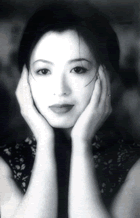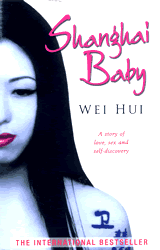
May Issue
June Issue
Shanghai
Baby
Wei Hui
Translated by Bruce Humes
Shanghai Baby, like most semi-autobiographical works, has a fairly simple story complicated only by the "heroine's" unsure morality and understanding of life. Although Coco, the author's promiscuous and narcissistic lead, is obviously intelligent and mildly successful, she represents the stereotypical idle and uncompromising writer. She attributes her irresponsible culture to Shanghai but does not make any excuses for herself or her company.
Wei Hui/Coco contradicts herself throughout the book, which gives the narration hard-edged reality. She adores her Western lover Mark. She "loves" Tian Tian, her impotent (and addicted) artist and boyfriend. Wei Hui, if indeed she wrote from firsthand experience, reveals her hypocritical views on people -- she constantly praises and criticizes the faults of her divorced cousin Zhu Sha, the one-time mamasan Madonna and the ethereally beautifiul Flying Apple.
I am not a wide reader by any means, generally avoiding books that attempt to provide a "contemporary" and overly critical view of a society and country. As a reader who prefers the formulaic heroic tale, Coco's lack of moral growth and her close-minded behavior (especially in terms of Tian Tian's drug addiction and her own dalliances with her lover) doesn't make her a sympathetic character. In fact, Coco is a character most people would be disgusted with -- she bemoans and wails about her fate but goes on about through most of the book unaffected. She is the least interesting character because she never changes: Tian Tian, Madonna and Zhu Sha are infinitely more interesting.
Perhaps it's due to Bruce Humes' translation but since Wei Hui is obviously familiar with English, I am sure she read through her own book and allowed the melodramatic garbage that occurs all too often.
Her discussions of her vagina and her sexual activities are distracting and Coco's musings are hardly original and lack insight.
Wei Hui/Coco, influenced by Western thinking, displays her ignorance and lack of appreciation for her own thoughts. Her insistence of putting quotes, excerpts and lines from songs and books in the beginning of her chapters show only that she is well-read and again, self-promoting.
In many ways, Wei Hui/Coco is as self-absorbed as Sei Shonagon but lacks half of Shonagon's wit and intelligence. Wei Hui, in typical female fashion, constantly praises her good looks and litters the book on descriptions of how often men ogle her. Moreover, She also constantly reminds the reader that despite spending her life in a "Bohemian" and sexually free life, she is widely popular as a writer and is a recognized intellectual. Admittedly, all writers fall into the pit of back-patting in their writings, but Wei Hui falls too often up to the point of redundancy.
To her credit, however, Wei Hui makes up for her many failings with several charming and surprisingly hard-felt chapters to conclude the book. The party, which includes the general cast members, was rendered very well and was a great tool to round up everyone. The climax was also well done though only adds more to the reader's disgust for Coco and the author -- no one in the book is more superficial and stupidly intelligent than Coco.
Rating:
![]()

Daughter of an army officer, Wei Hui studied literature at the Fudan University in Shanghai. Shanghai Baby was banned by the State in April 2000 with 20,000 copies publicly burned due to its poor influence on the youth. Her follow up to Shanghai Baby is "Marrying Buddha." She has written 4 other books before Shanhai Baby.

Shanghai Baby
Wei Hui
Translated by Bruce Humes (2001)
Vintage Publishing
 |
 |
 |
 |
 |